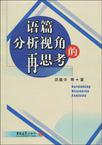语篇分析视角的再思考
2009-12
吉林大学出版社
项蕴华
275
《语篇分析视角的再思考》着重介绍了以Fairclough,vanDijk和Wodak为代表的批评性语篇分析的三大主要流派,并且探讨了语篇与社会、身份的叙事建构、语篇、意识形态与权力、性别与语言的关系。此外,上述语篇分析理论和方法在8篇范文中得以应用,希望能够起到一定的示范作用,促进语篇分析理论与实践的结合。希望《语篇分析视角的再思考》能够对于国内的语篇研究人员和研究生具有一定的借鉴意义。
项蕴华(1967-),女,江苏无锡人,2005年6月在南开大学外国语学院英语系获得文学博士学位,现任吉林大学外国语学院教授,硕士生导师,吉林大学哲学社会学院博士后。其主要研究方向为(批评性)语篇分析、社会语言学和语言哲学。先后在《外语学刊》、《吉林大学社会科学学报》、《山东外语教学》《哲学动态》和《社会科学研究》等核心期刊上发表过学术论文。目前正在承担语篇分析和语言哲学领域的科研项目。
Part I Discourse Analysis TheoryChapter 1 An Introduction to Discourse Analysis1.1 Language1.1.1 Saussure's view of language1.1.2 Bloomfield's view of language1.1.3 Chomsky's view of language1.1.4 Functionalist view of language1.1.5 Volosinov and Bakhtin' s view of language1.1.6 Foucault's view of discourse1.1.7 Comparison among different views of language 1.2 Linguistic forms and functions1.2.1 Spoken language and written language1.2.2 Utterances and sentences1.2.3 The functions of language1.3 Text1.3.1 The treatment of texts1.3.2 Properties of texts1.3.3 Summary1.4 Discourse Analysis1.4.1 Discourse1.4.2 The development of discourse analysis.Chapter 2 Critical Discourse Analysis2.1 An introduction to CDA2.1.1 Development of CDA2.1.2 Basic notions of CDA2.1.3 Research areas and topics 2.1.4 Methodologies of CDA2.1.5 Summary2.2 The Dialectical-Relational Approach.2.2.1 Key notions2.2.2 Analytical devices2.2.3 Methodological issues in crisis research2.2.4 Fields of application2.2.5 Cultural Political Economy Research Centre.2.2.6 Comments2.3 The Socio-Cognitive Approach2.3.1 The discourse-cognition-society triangle.2.3.2 Analytical devices2.3.3 Context Models2.3.4 Event Models2.3.5 Ideology and prejudice2.3.6 Social situations2.3.7 Related journals2.3.8 Comments2.4 The Discourse-Historical Approach.2.4.1 Key notions2.4.2 Analytical devices2.4.3 The Discursive Construction of National Identity2.4.4 The Discourse of Politics in Action.2.4.5 Research centres and journals2.4.6 Comments2.5 SummaryChapter 3 Discourse and Society3 A Kxess' approach3.1.1 The linguistic reproduction of the social3.1.2 The social production of language3.2 Fairclough's approach3.3 Text structure and social structure.Chapter 4 Narrative Construction of Identity4.1 Narrative and narrative analysis4.2 Narrative analysis of identity construction4.3 Labov's Evaluation ModelChapter 5 Discourse, Ideology and Power5.1 Discourse and Ideology5.1.1 The strands and assumptions of ideology5.1.2 The functions of ideology5.1.3 The cognitive interface between discourse and ideology5.1.4 The analytical levels of ideological analysis5.2 Discourse and power5.2.1 The relationship between discourse and power5.2.2 Asymmetry of power5.2.3 Removing markers of power asymmetry5.2.4 Summary.Chapter 6 Gender and Language6.1 Different approaches.6.1.1 Dominance Approach6.1.2 (Sub) Cultural Difference Approach6.1.3 Gender Diversity Approach6.2 Methodologies of Gender Studies6.2.1 Introspection6.2.2 Sociolinguistic Surveys6.2.3 Focus Groups6.3 Gender and Talk.6.3.1 The Deficit Approach6.3.2 The (Male) Dominance Approach6.3.3 The (Cultural) Difference Approach6.3.4 The Performance Approach and Positioning Approach6.4 Gender and Education6.4.1 Related Studies in the 1970s and 1980s6.4.2 Related Studies in the 1990s6.4.3 Related Studies since 20006.5 Gender and Children's Fiction6.5.1 The Change of Children's Fiction6.5.2 The Analysis of Children's Fictions6.6 Gender and Advertisements6.7 Gender, Ageism and Sexist DiscoursePart Ⅱ Discourse Analysis Practice.Sample 1Sample 2Sample 3Sample 4Sample 5Sample 6Sample 7ReferencesAppendix 1Appendix 2Appendix 3Appendix 4Appendix 5后记
1.1.4 Functionalist view of language Challenging Chomsky's notions of linguistic competence andperformance and his insistence on the autonomy of syntax, functionalistlinguistics(including Halliday's Systemic-functional Grammar), socio-linguistics, pragmatics and (critical) discourse analysis all emphasize thesocial functions of language. Functionalism reflects a shift of emphasis inlinguistic studies from syntactics to extra-sentential considerations foreffective interpretations of language (Zhang, 1998: xviii). Unlike mainstream linguistics, systemic-functional linguisticscharacterizes meaning as choice from sets of systems in specific contexts,so all linguistic forms are taken as the effect of (deliberate) choice, and allforms are meaningful as the result of choice. Besides, all signs withingrammar (excepting certain areas of exis)are taken as motivated, ratherthan arbitrary. Fairclough(1989: 13-14)emphasizes the importance of socialanalysis in language study. He thinks that functionalist approaches(suchas the systemic linguistics by Halliday) are more helpful than formalistapproaches (such as the Transformational-generative Grammar byChomsky).1.1.5 Volosinov and Bakhtin's view of language Bakhtin has been identified as the leader of the school ofsemioticians in the late 1920s and early 1930s in the former USSR, andVolosinov is his closest follower and collaborator(Volosinov, 1973: 6).The rejection of Saussure's dualism, that is, his dichotomy of synchronyand diachrony, and statics versus dynamics, is typical for Volosinov'sphilosophy of language in particular and Bakhtin's Leningrad School ingeneral(ibid: 167). ……
